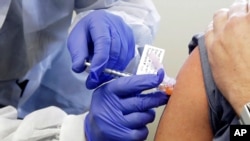ບັນດານັກຄົ້ນຄວ້າສະຫະລັດ ກ່າວວ່າ ຢາວັກຊິນກັນໄວຣັສໂຄໂຣນາທີ່ພວມ ທຳການ
ທົດລອງ ໄດ້ສະແດງໃຫ້ເຫັນ ໃນຄວາມຫວັງ ກ່ຽວກັບການຕອບຮັບຂອງພູມຕ້ານທານ
ໃນການສຶກສາຂັ້ນເລີ້ມຕົ້ນ.
ຢາວັກຊິນໃໝ່ ທີ່ໃຫ້ຄວາມຫວັງດັ່ງກ່າວ ແມ່ນຜະລິດໂດຍບໍລິສັດໄບໂອເທັກ Moderna
ທີ່ຕັ້ງຢູ່ໃນສະຫະລັດ ແລະພັດທະນາໂດຍບັນດານັກຄົ້ນຄວ້າ ຢູ່ ສະຖາບັນພະຍາດຕິດ
ແປດ ແລະພູມແພ້ແຫ່ງຊາດ. ຢູ່ໃນລາຍງານທີ່ພິມເຜີຍ ແຜ່ ໂດຍວາລະສານການແພດ
New England Journal of Medicine ໃນວັນອັງຄານວານນີ້ ພວກນັກຄົ້ນຄວ້າ ໄດ້
ໃຫ້ຢາວັກຊິນທົດລອງສອງໂດສ ແກ່ພວກອາສາສະໝັກ 45 ຄົນ ຜູ້ທີີມີອາຍຸລະຫວ່າງ
18 ແລະ 55 ປີ.
ບັນດານັກຄົ້ນຄວ້າກ່າວວ່າ ບໍ່ມີອາສາສະໝັກທົດທອງຄົນໃດ ໃຫ້ຮ່ອງຮອຍວ່າ ໄດ້ຮັບ
ຜົນກະທົບຂ້າງຄຽງທີ່ຮ້າຍແຮງ ແຕ່ວ່າຫຼາຍກວ່າເຄິ່ງນຶ່ງ ລາຍງານວ່າ ມີປະຕິກິລິຍາພໍ
ປານກາງເຊັ່ນວ່າ ເໝື່ອຍ ເຈັບຫົວ ໜາວ ເຈັບກ້າມເນື້ອ ແລະເຈັບຢູ່ບ່ອນສັກຢາ.
ຜົນຂອງການທົດລອງຢາວັກຊິນ ທີ່ໃຊ້ເປັນເທື່ອທຳອິດກັບມະນຸດ ແມ່ນເປັນພາກສ່ວນ
ນຶ່ງຂອງການທົດລອງຂັ້ນທີນຶ່ງ ທີ່ແນໃສ່ວ່າ ການໃຫ້ຢາວັກຊີນໃນ ລະດັບຕໍ່າ ລະດັບປານ
ກາງ ແລະລະດັບສູງ ແມ່ນເພື່ອຊັ່ງຊາເພື່ອທັງໃນດ້ານຄວາມປອດໄພ ແລະການສ້າງພູມ
ຕ້ານທານ.
ດຣ. ວິລລຽມ ແຊຟເນີ ຜູ້ຊ່ຽວຊານດ້ານພະຍາດຕິດແປດ ທີ່ສະຖາບັນການ ແພດຂອງ
ມະຫາວິທະຍາໄລ Vanderbilt ຢູ່ເມືອງ Nashville ລັດເທນເນສຊີ ຜູ້ທີ່ບໍ່ໄດ້ພົວພັນກັບ
ການຄົ້ນຄວ້າກ່າວວ່າ “ນີ້ເປັນບາດກ້າວທຳອິດ ແຕ່ກໍເປັນບາດກ້າວທີ່ຕື່ນເຕັ້ນເທື່ອທຳອິດ.”
ບໍລິສັດ Moderna ປັດຈຸບັນນີ້ ຢູ່ໃນການທົດລອງຂັ້ນທີສອງໃນການນຳໃຊ້ຢາວັກຊິນ ຊຶ່ງ
ຈະພົວພັນກັບກຸ່ມອາສາສະໜັກ ທີ່ໃຫຍ່ກວ່ານີ້ ເພື່ີອພິຈາລະນາເບິ່ງ ປະສິດທິຜົນ. ບໍລິສັດ
ດັ່ງກ່າວນີ້ ຈະເລີ້ມການທົດລອງຂັ້ນທີສາມ ໃນວັນທີ 27 ກໍລະກົດ ຊຶ່ງຈະພົວພັນກັບພວກ
ອາສາສະໝັກ 30,000 ຄົນ ຊຶ່ງເປັນການຄົ້ນ ຄວ້າທີ່ໃຫຍ່ສຸດກ່ຽວກັບການທົດລອງຢາ
ວັກຊິນກັນໂຄວິດ-19 ເທົ່າທີ່ເຄີຍມີມາ.
ບໍລິສັດໄບໂອເທັກອີກແຫ່ງນຶ່ງຄື Johson & Johnson ຍັງຄາດວ່າຈະເລີ້ມ ການທົດລອງ
ຢາວັກຊີນຂັ້ນຫລ້າສຸດກັບມະນຸດ ໃນທ້າຍເດືອນກໍລະກົດຈະມາ ເຖິງນີ້.
ໃນຂະນະດຽວກັນບັນດານາຍແພດໃນປະເທດຝຣັ່ງ ມີລາຍງານ ກ່ຽວກັບອັນທີ່ ເຊື່ອກັນ
ວ່າ ເປັນກໍລະນີທຳອິດທີ່ພະຍາດໂຄວິດ-19 ສາມາດຕິດຈາກແມ່ທີ່ຖືພາ ໄປຫາແອນ້ອຍ
ຢູ່ໃນມົດລູກ.
U.S. researchers say an experimental coronavirus vaccine has shown promising immune responses in an on-going early-stage study.
The potential new vaccine was manufactured by U.S.-based biotech firm
Moderna and developed by researchers at the National Institute of Allergy and Infectious Diseases. In a report published in the New England Journal of Medicine Tuesday, the researchers gave two doses of the experimental vaccine to 45 volunteers, whose ages ranged between 18 and 55.
The researchers said none of the volunteers experienced a serious side effect, but more than half reported mild or moderate reactions such as fatigue, headaches, chills, muscle aches and pain at the injection site.
The results of the vaccine, the first to be tested in humans, was part of the first phase of a trial designed to test low, medium and high doses of the vaccine to gauge both its safety and its ability to create immunity.
“It’s a first step, but it is an exciting first step," said Dr. William Schaffner, an infectious disease expert at Vanderbilt University Medical Center in Nashville, Tennessee, who was not involved in the study.
Moderna is currently in the second testing phase of the vaccine, which will involve a larger group of volunteers to determine its effectiveness. The company will launch a third testing phase on July 27, which will involve 30,000 volunteers, the largest study of a potential COVID-19 vaccine so far.
Another biotech firm, Johnson & Johnson, is also expected to begin late-stage human trials for a potential vaccine by the end of July.
Meanwhile, doctors in France are reporting what is believed to be the first case that COVID-19 can be transmitted from a pregnant mother to a baby in the womb





